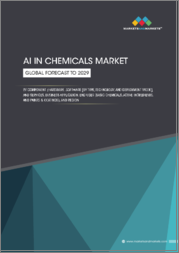
|
시장보고서
상품코드
1572252
기초 화학제품 시장 : 부문별 예측(2025-2030년)Basic Chemicals Market by Product Type (Inorganic Chemicals, Organic Chemicals), Application (Agriculture, Construction, Textile), End-User, Production Process - Global Forecast 2025-2030 |
||||||
기초 화학제품(Basic Chemicals) 시장은 2023년에 3조 5,100억 달러로 평가되었고, 2024년에는 3조 6,000억 달러에 이를 것으로 추정되며, CAGR 5.61%로 성장하며 2030년에는 5조 1,500억 달러에 달할 것으로 예측됩니다.
기초 화학제품 시장의 범위에는 제조, 농업, 의약품, 건설 등 산업에 걸친 광범위한 파생 제품의 생산에 필수적인 다양한 원료가 포함되어 있습니다. 석유화학제품, 비료, 산업가스, 기타 기초 화학제품을 포함한 기초 화학제품은 보다 복잡한 화학화합물 및 재료에 필수적인 구성요소로 작용하며, 산업용 및 소비자용도에 대한 필요성과 편재 성을 돋보이게 합니다. 최종 용도의 범위는 넓고, 식품 가공이나 환경 서비스 등 분야에 영향을 미치고, 기초 화학제품이 중요한 역할을 하고 있습니다.
| 주요 시장 통계 | |
|---|---|
| 기준연도(2023년) | 3조 5,100억 달러 |
| 추정연도(2024년) | 3조 6,000억 달러 |
| 예측연도(2030년) | 5조 1,500억 달러 |
| CAGR(%) | 5.61% |
이 시장의 주요 성장 요인으로는 생산 효율 향상을 목표로 하는 기술 진보, 신흥국의 산업화에 의한 수요 증가, 환경에 대한 영향을 경감하기 위한 지속 가능한 화학 프로세스에 대한 주목 증가 등 있습니다. 또한, 친환경 화학의 상승과 바이오 화학 물질의 개발은 큰 잠재 기회를 가져왔습니다. 기업은 지속 가능한 생산방법에 투자하고 아시아나 남미의 급속히 공업화가 진행되는 지역 등 미개척의 성장 가능성을 지닌 시장에 진입함으로써 이러한 동향을 활용할 수 있습니다.
그러나 시장은 엄격한 환경 규제, 변동하는 원료 가격, 공급망을 혼동시킬 수 있는 지정학적 긴장 등 과제에 직면하고 있습니다. 게다가 기존의 생산방법에서는 기술 혁신이 한정되어 있기 때문에 경쟁력을 유지하기 위해서는 전략적인 연구개발이 필요합니다. 이러한 과제를 극복하기 위해 기업은 재생 가능한 원료 개발, 재활용 프로세스 강화, 화학 생산 최적화를 위한 디지털 솔루션의 개척 등 혁신 분야에 주력해야 합니다.
전략적으로 기업은 파트너십과 협력 관계를 맺고 연구를 추진하고 재생 불가능한 자원에 대한 의존도를 줄일 수 있는 혁신적인 프로세스를 개발해야 합니다. 시장의 역동적인 특성은 소비자 동향에 대한 날카로운 통찰력을 유지하면서 규제 변경과 공급망 변화에 적응할 수있는 민첩한 기업에게 유리합니다. 지속가능성과 최첨단 기술을 통합함으로써 기업은 시장 상황의 변화에 유리한 위치를 차지할 수 있습니다.
시장 역학 : 빠르게 진화하는 기초 화학제품 시장의 주요 인사이트
기초 화학제품 시장은 수요 및 공급의 역동적인 상호작용에 의해 변모하고 있습니다. 이러한 시장 역학의 진화를 이해함으로써 기업은 충분한 정보를 바탕으로 투자결정, 전략적 의사결정, 새로운 비즈니스 기회를 획득할 수 있습니다. 이러한 동향을 종합적으로 파악함으로써 기업은 정치적, 지리적, 기술적, 사회적, 경제적인 영역에 걸친 다양한 리스크를 경감할 수 있음과 동시에, 소비자 행동과 그것이 제조 비용이나 구매 동향에 미치는 영향을 보다 명확하게 이해할 수 있습니다.
- 시장 성장 촉진요인
- 유해성이 낮고 친환경 화학물질 사용을 촉진하는 정부규제
- 농업, 의약품, 자동차 등 최종 용도 산업 확대
- 혁신적인 화학 솔루션을 위한 R&D 투자 증가
- 시장 성장 억제요인
- 기초 화학제품 시장의 제조 비용과 공급망에 영향을 주는 엄격한 환경 규제
- 기초 화학제품의 원료 공급의 단절과 시장의 불안정화로 이어지는 지정학적 긴장
- 시장 기회
- 기존의 석유화학제품에 대한 바이오베이스 제품의 개발에 의한 환경면의 장점
- 기초 화학제품분야에서 생산과 공급망 최적화를 위한 디지털 전환과 인더스트리 4.0 활용
- 기초 화학제품 시장 성장 기회를 살리기 위한 신흥 시장의 개척과 지역 확대
- 시장 과제
- 화학제품 제조업체 전체의 수익성에 영향을 미치는 원재료 가격의 변동
Porter's Five Forces : 기초 화학제품 시장을 탐색하는 전략 도구
Porter's Five Forces 프레임워크는 시장 상황경쟁 구도를 이해하는 중요한 도구입니다. Porter's Five Forces 프레임워크는 기업의 경쟁력을 평가하고 전략적 기회를 탐구하는 명확한 기술을 제공합니다. 이 프레임워크는 기업이 시장 내 세력도를 평가하고 신규 사업의 수익성을 결정하는 데 도움이 됩니다. 이러한 통찰을 통해 기업은 자사의 강점을 활용하고, 약점을 해결하고, 잠재적인 과제를 피할 수 있으며, 보다 탄력적인 시장 포지셔닝을 보장할 수 있습니다.
PESTLE 분석 : 기초 화학제품 시장에서 외부 영향을 파악
외부 거시 환경 요인은 기초 화학제품 시장의 성과 역학을 형성하는 데 매우 중요한 역할을 합니다. 정치적, 경제적, 사회적, 기술적, 법적, 환경적 요인 분석은 이러한 영향을 탐색하는 데 필요한 정보를 제공합니다. PESTLE 요인을 조사함으로써 기업은 잠재적인 위험과 기회를 더 잘 이해할 수 있습니다. 이 분석을 통해 기업은 규제, 소비자 선호, 경제 동향의 변화를 예측하고 앞으로 예상되는 적극적인 의사 결정을 할 준비를 할 수 있습니다.
시장 점유율 분석 : 기초 화학제품 시장에서 경쟁 구도 파악
기초 화학제품 시장의 상세한 시장 점유율 분석을 통해 공급업체의 성과를 종합적으로 평가할 수 있습니다. 기업은 수익, 고객 기반, 성장률 등 주요 지표를 비교하여 경쟁 포지셔닝을 밝힐 수 있습니다. 이 분석을 통해 시장 집중, 단편화, 통합 동향을 밝혀내고 벤더들은 경쟁이 치열해지는 가운데 자사의 지위를 높이는 전략적 의사 결정을 내리는 데 필요한 지식을 얻을 수 있습니다.
FPNV 포지셔닝 매트릭스 : 기초 화학제품 시장에서 공급업체의 성과 평가
FPNV 포지셔닝 매트릭스는 기초 화학제품 시장에서 공급업체를 평가하는 중요한 도구입니다. 이 행렬을 통해 비즈니스 조직은 공급업체의 비즈니스 전략과 제품 만족도를 기준으로 평가하여 목표에 맞는 충분한 정보를 바탕으로 의사 결정을 내릴 수 있습니다. 네 가지 사분면을 통해 공급업체를 명확하고 정확하게 부문화하고 전략 목표에 가장 적합한 파트너 및 솔루션을 파악할 수 있습니다.
전략 분석 및 추천 : 기초 화학제품 시장에서 성공을 위한 길을 그리기
기초 화학제품 시장의 전략 분석은 세계 시장에서 존재를 강화하려는 기업에 필수적입니다. 주요 자원, 역량 및 성과 지표를 검토함으로써 기업은 성장 기회를 파악하고 개선을 위해 노력할 수 있습니다. 이러한 접근 방식을 통해 경쟁 구도에서 과제를 극복하고 새로운 비즈니스 기회를 활용하여 장기적인 성공을 거둘 수 있는 체제를 구축할 수 있습니다.
이 보고서는 주요 관심 분야를 포괄하는 시장의 종합적인 분석을 제공합니다.
1. 시장 침투 : 현재 시장 환경의 상세한 검토, 주요 기업의 광범위한 데이터, 시장 도달범위 및 전반적인 영향력 평가를 제공합니다.
2. 시장 개척도 : 신흥 시장 성장 기회를 파악하고 기존 분야의 확장 가능성을 평가하며 미래 성장을 위한 전략적 로드맵을 제공합니다.
3. 시장 다양화 : 최근 제품 시장, 미개척 지역, 산업의 주요 진보, 시장을 형성하는 전략적 투자를 분석합니다.
4. 경쟁 평가 및 정보 : 경쟁 구도를 철저히 분석하여 시장 점유율, 사업 전략, 제품 포트폴리오, 인증, 규제 당국 승인, 특허 동향, 주요 기업의 기술 진보 등을 검증합니다.
5. 제품 개발 및 혁신 : 향후 시장 성장을 가속할 것으로 예상되는 최첨단 기술, R&D 활동, 제품 혁신을 강조합니다.
또한 이해관계자가 충분한 정보를 얻고 의사결정을 할 수 있도록 중요한 질문에 대답하고 있습니다.
1. 현재 시장 규모와 향후 성장 예측은?
2. 최고의 투자 기회를 제공하는 제품, 부문 및 지역은?
3. 시장을 형성하는 주요 기술 동향과 규제의 영향은?
4. 주요 벤더의 시장 점유율과 경쟁 포지션은?
5. 벤더 시장 진입·철수 전략의 원동력이 되는 수익원과 전략적 기회는?
목차
제1장 서문
제2장 조사 방법
제3장 주요 요약
제4장 시장 개요
제5장 시장 인사이트
- 시장 역학
- 성장 촉진요인
- 보다 위험성이 낮고 친환경 화학물질 사용을 촉진하는 정부의 규제
- 농업, 의약품, 자동차 등 최종 용도 산업 확대
- 혁신적인 화학 솔루션의 R&D 투자 증가
- 억제요인
- 엄격한 환경 규제가 제조 비용과 공급망에 영향을 미치는 기초 화학제품 시장
- 지정학적 긴장에 의해 원재료 공급이 혼란해, 기초 화학제품 시장이 불안정화
- 기회
- 환경상의 이점을 고려해, 기존의 석유화학제품에 대신하는 바이오베이스의 대체품을 개발
- 디지털 전환과 인더스트리 4.0을 활용해 기초 화학제품 섹터의 생산과 공급 체인을 최적화
- 신흥 시장과 지역 확대를 활용하여 성장 기회를 활용하는 기초 화학제품 시장
- 과제
- 원재료 가격의 변동이 화학 제조업체 전체의 수익성에 영향
- 성장 촉진요인
- 시장 세분화 분석
- Porter's Five Forces 분석
- PESTLE 분석
- 정치적
- 경제적
- 사회적
- 기술적
- 법적
- 환경적
제6장 기초 화학제품 시장 : 제품 유형별
- 무기화학제품
- 공업용 화학제품
- 특수 화학제품
- 유기화학제품
- 석유 화학제품
- 폴리머
제7장 기초 화학제품 시장 : 용도별
- 농업
- 비료
- 농약
- 공업
- 시멘트
- 콘크리트
- 섬유
- 염료 및 안료
- 섬유 보조제
제8장 기초 화학제품 시장 : 최종 사용자별
- 자동차산업
- 소비재 산업
- 에너지 부문
- 제약산업
제9장 기초 화학제품 시장 : 제조 공정별
- 배치 프로세스
- 연속 프로세스
제10장 아메리카의 기초 화학제품 시장
- 아르헨티나
- 브라질
- 캐나다
- 멕시코
- 미국
제11장 아시아 태평양의 기초 화학제품 시장
- 호주
- 중국
- 인도
- 인도네시아
- 일본
- 말레이시아
- 필리핀
- 싱가포르
- 한국
- 대만
- 태국
- 베트남
제12장 유럽·중동 및 아프리카의 기초 화학제품 시장
- 덴마크
- 이집트
- 핀란드
- 프랑스
- 독일
- 이스라엘
- 이탈리아
- 네덜란드
- 나이지리아
- 노르웨이
- 폴란드
- 카타르
- 러시아
- 사우디아라비아
- 남아프리카공화국
- 스페인
- 스웨덴
- 스위스
- 터키
- 아랍에미리트(UAE)
- 영국
제13장 경쟁 구도
- 시장 점유율 분석(2023년)
- FPNV 포지셔닝 매트릭스(2023년)
- 경쟁 시나리오 분석
- 전략 분석 및 제안
The Basic Chemicals Market was valued at USD 3.51 trillion in 2023, expected to reach USD 3.60 trillion in 2024, and is projected to grow at a CAGR of 5.61%, to USD 5.15 trillion by 2030.
The scope of the basic chemicals market encompasses various raw materials critical in producing a broad range of derivative products across industries such as manufacturing, agriculture, pharmaceuticals, and construction. Basic chemicals, including petrochemicals, fertilizers, industrial gases, and other fundamental chemical products, serve as essential building blocks for more complex chemical compounds and materials, underscoring their necessity and ubiquity in industrial and consumer applications. The end-use scope is extensive, impacting sectors like food processing and environmental services, where basic chemicals play crucial roles.
| KEY MARKET STATISTICS | |
|---|---|
| Base Year [2023] | USD 3.51 trillion |
| Estimated Year [2024] | USD 3.60 trillion |
| Forecast Year [2030] | USD 5.15 trillion |
| CAGR (%) | 5.61% |
Key growth factors in this market include technological advancements aimed at improving production efficiency, increasing demand driven by industrialization in emerging economies, and a heightened focus on sustainable chemical processes to mitigate environmental impact. Additionally, the rise of green chemistry practices and the development of bio-based chemicals present significant potential opportunities. Companies can capitalize on these trends by investing in sustainable production methods and entering markets with untapped growth potential, such as rapidly industrializing regions in Asia and Latin America.
However, the market faces challenges including stringent environmental regulations, fluctuating raw material prices, and geopolitical tensions that could disrupt supply chains. Moreover, limited technological innovation in traditional production methods poses constraints, demanding strategic R&D to remain competitive. To overcome these challenges, firms must focus on innovation areas such as developing renewable feedstocks, enhancing recycling processes, and pioneering digital solutions for optimizing chemical production.
Strategically, businesses should engage in partnerships and collaborations to drive research and develop innovative processes that can reduce dependency on non-renewable resources. The market's dynamic nature favors agile players who can adapt to regulatory changes and supply chain shifts while maintaining a keen insight into consumer trends. By embracing sustainability and cutting-edge technologies, companies can position themselves advantageously in the evolving landscape of the basic chemicals market.
Market Dynamics: Unveiling Key Market Insights in the Rapidly Evolving Basic Chemicals Market
The Basic Chemicals Market is undergoing transformative changes driven by a dynamic interplay of supply and demand factors. Understanding these evolving market dynamics prepares business organizations to make informed investment decisions, refine strategic decisions, and seize new opportunities. By gaining a comprehensive view of these trends, business organizations can mitigate various risks across political, geographic, technical, social, and economic domains while also gaining a clearer understanding of consumer behavior and its impact on manufacturing costs and purchasing trends.
- Market Drivers
- Government regulations promoting the use of less hazardous and greener chemicals
- Expansion of end-use industries such as agriculture, pharmaceuticals, and automotive
- Increasing investments in research and development for innovative chemical solutions
- Market Restraints
- Stringent environmental regulations impacting manufacturing costs and supply chains in the basic chemicals market
- Geopolitical tensions leading to raw material supply disruptions and market instability for basic chemicals
- Market Opportunities
- Developing bio-based alternatives to traditional petrochemical products for environmental benefits
- Leveraging digital transformation and Industry 4.0 for optimizing production and supply chain in the basic chemicals sector
- Exploiting emerging markets and regional expansions to capitalize on growth opportunities in the basic chemicals market
- Market Challenges
- Fluctuating raw material prices impacting the overall profitability of chemical manufacturers
Porter's Five Forces: A Strategic Tool for Navigating the Basic Chemicals Market
Porter's five forces framework is a critical tool for understanding the competitive landscape of the Basic Chemicals Market. It offers business organizations with a clear methodology for evaluating their competitive positioning and exploring strategic opportunities. This framework helps businesses assess the power dynamics within the market and determine the profitability of new ventures. With these insights, business organizations can leverage their strengths, address weaknesses, and avoid potential challenges, ensuring a more resilient market positioning.
PESTLE Analysis: Navigating External Influences in the Basic Chemicals Market
External macro-environmental factors play a pivotal role in shaping the performance dynamics of the Basic Chemicals Market. Political, Economic, Social, Technological, Legal, and Environmental factors analysis provides the necessary information to navigate these influences. By examining PESTLE factors, businesses can better understand potential risks and opportunities. This analysis enables business organizations to anticipate changes in regulations, consumer preferences, and economic trends, ensuring they are prepared to make proactive, forward-thinking decisions.
Market Share Analysis: Understanding the Competitive Landscape in the Basic Chemicals Market
A detailed market share analysis in the Basic Chemicals Market provides a comprehensive assessment of vendors' performance. Companies can identify their competitive positioning by comparing key metrics, including revenue, customer base, and growth rates. This analysis highlights market concentration, fragmentation, and trends in consolidation, offering vendors the insights required to make strategic decisions that enhance their position in an increasingly competitive landscape.
FPNV Positioning Matrix: Evaluating Vendors' Performance in the Basic Chemicals Market
The Forefront, Pathfinder, Niche, Vital (FPNV) Positioning Matrix is a critical tool for evaluating vendors within the Basic Chemicals Market. This matrix enables business organizations to make well-informed decisions that align with their goals by assessing vendors based on their business strategy and product satisfaction. The four quadrants provide a clear and precise segmentation of vendors, helping users identify the right partners and solutions that best fit their strategic objectives.
Strategy Analysis & Recommendation: Charting a Path to Success in the Basic Chemicals Market
A strategic analysis of the Basic Chemicals Market is essential for businesses looking to strengthen their global market presence. By reviewing key resources, capabilities, and performance indicators, business organizations can identify growth opportunities and work toward improvement. This approach helps businesses navigate challenges in the competitive landscape and ensures they are well-positioned to capitalize on newer opportunities and drive long-term success.
Key Company Profiles
The report delves into recent significant developments in the Basic Chemicals Market, highlighting leading vendors and their innovative profiles. These include Akzo Nobel N.V., Asahi Kasei Corporation, BASF SE, Braskem S.A., Celanese Corporation, Covestro AG, Dow Inc., DuPont de Nemours, Inc., Eastman Chemical Company, Evonik Industries AG, ExxonMobil Chemical Company, Formosa Plastics Corporation, Huntsman Corporation, INEOS Group Holdings S.A., LG Chem Ltd., Lotte Chemical Corporation, LyondellBasell Industries N.V., Mitsubishi Chemical Holdings Corporation, SABIC, and Sumitomo Chemical Co., Ltd..
Market Segmentation & Coverage
This research report categorizes the Basic Chemicals Market to forecast the revenues and analyze trends in each of the following sub-markets:
- Based on Product Type, market is studied across Inorganic Chemicals and Organic Chemicals. The Inorganic Chemicals is further studied across Industrial Chemicals and Specialty Chemicals. The Organic Chemicals is further studied across Petrochemicals and Polymers.
- Based on Application, market is studied across Agriculture, Construction, and Textile. The Agriculture is further studied across Fertilizers and Pesticides. The Construction is further studied across Cement and Concrete. The Textile is further studied across Dyes And Pigments and Textile Auxiliaries.
- Based on End-User, market is studied across Automotive Industry, Consumer Goods Industry, Energy Sector, and Pharmaceutical Industry.
- Based on Production Process, market is studied across Batch Process and Continuous Process.
- Based on Region, market is studied across Americas, Asia-Pacific, and Europe, Middle East & Africa. The Americas is further studied across Argentina, Brazil, Canada, Mexico, and United States. The United States is further studied across California, Florida, Illinois, New York, Ohio, Pennsylvania, and Texas. The Asia-Pacific is further studied across Australia, China, India, Indonesia, Japan, Malaysia, Philippines, Singapore, South Korea, Taiwan, Thailand, and Vietnam. The Europe, Middle East & Africa is further studied across Denmark, Egypt, Finland, France, Germany, Israel, Italy, Netherlands, Nigeria, Norway, Poland, Qatar, Russia, Saudi Arabia, South Africa, Spain, Sweden, Switzerland, Turkey, United Arab Emirates, and United Kingdom.
The report offers a comprehensive analysis of the market, covering key focus areas:
1. Market Penetration: A detailed review of the current market environment, including extensive data from top industry players, evaluating their market reach and overall influence.
2. Market Development: Identifies growth opportunities in emerging markets and assesses expansion potential in established sectors, providing a strategic roadmap for future growth.
3. Market Diversification: Analyzes recent product launches, untapped geographic regions, major industry advancements, and strategic investments reshaping the market.
4. Competitive Assessment & Intelligence: Provides a thorough analysis of the competitive landscape, examining market share, business strategies, product portfolios, certifications, regulatory approvals, patent trends, and technological advancements of key players.
5. Product Development & Innovation: Highlights cutting-edge technologies, R&D activities, and product innovations expected to drive future market growth.
The report also answers critical questions to aid stakeholders in making informed decisions:
1. What is the current market size, and what is the forecasted growth?
2. Which products, segments, and regions offer the best investment opportunities?
3. What are the key technology trends and regulatory influences shaping the market?
4. How do leading vendors rank in terms of market share and competitive positioning?
5. What revenue sources and strategic opportunities drive vendors' market entry or exit strategies?
Table of Contents
1. Preface
- 1.1. Objectives of the Study
- 1.2. Market Segmentation & Coverage
- 1.3. Years Considered for the Study
- 1.4. Currency & Pricing
- 1.5. Language
- 1.6. Stakeholders
2. Research Methodology
- 2.1. Define: Research Objective
- 2.2. Determine: Research Design
- 2.3. Prepare: Research Instrument
- 2.4. Collect: Data Source
- 2.5. Analyze: Data Interpretation
- 2.6. Formulate: Data Verification
- 2.7. Publish: Research Report
- 2.8. Repeat: Report Update
3. Executive Summary
4. Market Overview
5. Market Insights
- 5.1. Market Dynamics
- 5.1.1. Drivers
- 5.1.1.1. Government regulations promoting the use of less hazardous and greener chemicals
- 5.1.1.2. Expansion of end-use industries such as agriculture, pharmaceuticals, and automotive
- 5.1.1.3. Increasing investments in research and development for innovative chemical solutions
- 5.1.2. Restraints
- 5.1.2.1. Stringent environmental regulations impacting manufacturing costs and supply chains in the basic chemicals market
- 5.1.2.2. Geopolitical tensions leading to raw material supply disruptions and market instability for basic chemicals
- 5.1.3. Opportunities
- 5.1.3.1. Developing bio-based alternatives to traditional petrochemical products for environmental benefits
- 5.1.3.2. Leveraging digital transformation and Industry 4.0 for optimizing production and supply chain in the basic chemicals sector
- 5.1.3.3. Exploiting emerging markets and regional expansions to capitalize on growth opportunities in the basic chemicals market
- 5.1.4. Challenges
- 5.1.4.1. Fluctuating raw material prices impacting the overall profitability of chemical manufacturers
- 5.1.1. Drivers
- 5.2. Market Segmentation Analysis
- 5.3. Porter's Five Forces Analysis
- 5.3.1. Threat of New Entrants
- 5.3.2. Threat of Substitutes
- 5.3.3. Bargaining Power of Customers
- 5.3.4. Bargaining Power of Suppliers
- 5.3.5. Industry Rivalry
- 5.4. PESTLE Analysis
- 5.4.1. Political
- 5.4.2. Economic
- 5.4.3. Social
- 5.4.4. Technological
- 5.4.5. Legal
- 5.4.6. Environmental
6. Basic Chemicals Market, by Product Type
- 6.1. Introduction
- 6.2. Inorganic Chemicals
- 6.2.1. Industrial Chemicals
- 6.2.2. Specialty Chemicals
- 6.3. Organic Chemicals
- 6.3.1. Petrochemicals
- 6.3.2. Polymers
7. Basic Chemicals Market, by Application
- 7.1. Introduction
- 7.2. Agriculture
- 7.2.1. Fertilizers
- 7.2.2. Pesticides
- 7.3. Construction
- 7.3.1. Cement
- 7.3.2. Concrete
- 7.4. Textile
- 7.4.1. Dyes And Pigments
- 7.4.2. Textile Auxiliaries
8. Basic Chemicals Market, by End-User
- 8.1. Introduction
- 8.2. Automotive Industry
- 8.3. Consumer Goods Industry
- 8.4. Energy Sector
- 8.5. Pharmaceutical Industry
9. Basic Chemicals Market, by Production Process
- 9.1. Introduction
- 9.2. Batch Process
- 9.3. Continuous Process
10. Americas Basic Chemicals Market
- 10.1. Introduction
- 10.2. Argentina
- 10.3. Brazil
- 10.4. Canada
- 10.5. Mexico
- 10.6. United States
11. Asia-Pacific Basic Chemicals Market
- 11.1. Introduction
- 11.2. Australia
- 11.3. China
- 11.4. India
- 11.5. Indonesia
- 11.6. Japan
- 11.7. Malaysia
- 11.8. Philippines
- 11.9. Singapore
- 11.10. South Korea
- 11.11. Taiwan
- 11.12. Thailand
- 11.13. Vietnam
12. Europe, Middle East & Africa Basic Chemicals Market
- 12.1. Introduction
- 12.2. Denmark
- 12.3. Egypt
- 12.4. Finland
- 12.5. France
- 12.6. Germany
- 12.7. Israel
- 12.8. Italy
- 12.9. Netherlands
- 12.10. Nigeria
- 12.11. Norway
- 12.12. Poland
- 12.13. Qatar
- 12.14. Russia
- 12.15. Saudi Arabia
- 12.16. South Africa
- 12.17. Spain
- 12.18. Sweden
- 12.19. Switzerland
- 12.20. Turkey
- 12.21. United Arab Emirates
- 12.22. United Kingdom
13. Competitive Landscape
- 13.1. Market Share Analysis, 2023
- 13.2. FPNV Positioning Matrix, 2023
- 13.3. Competitive Scenario Analysis
- 13.4. Strategy Analysis & Recommendation
Companies Mentioned
- 1. Akzo Nobel N.V.
- 2. Asahi Kasei Corporation
- 3. BASF SE
- 4. Braskem S.A.
- 5. Celanese Corporation
- 6. Covestro AG
- 7. Dow Inc.
- 8. DuPont de Nemours, Inc.
- 9. Eastman Chemical Company
- 10. Evonik Industries AG
- 11. ExxonMobil Chemical Company
- 12. Formosa Plastics Corporation
- 13. Huntsman Corporation
- 14. INEOS Group Holdings S.A.
- 15. LG Chem Ltd.
- 16. Lotte Chemical Corporation
- 17. LyondellBasell Industries N.V.
- 18. Mitsubishi Chemical Holdings Corporation
- 19. SABIC
- 20. Sumitomo Chemical Co., Ltd.


















